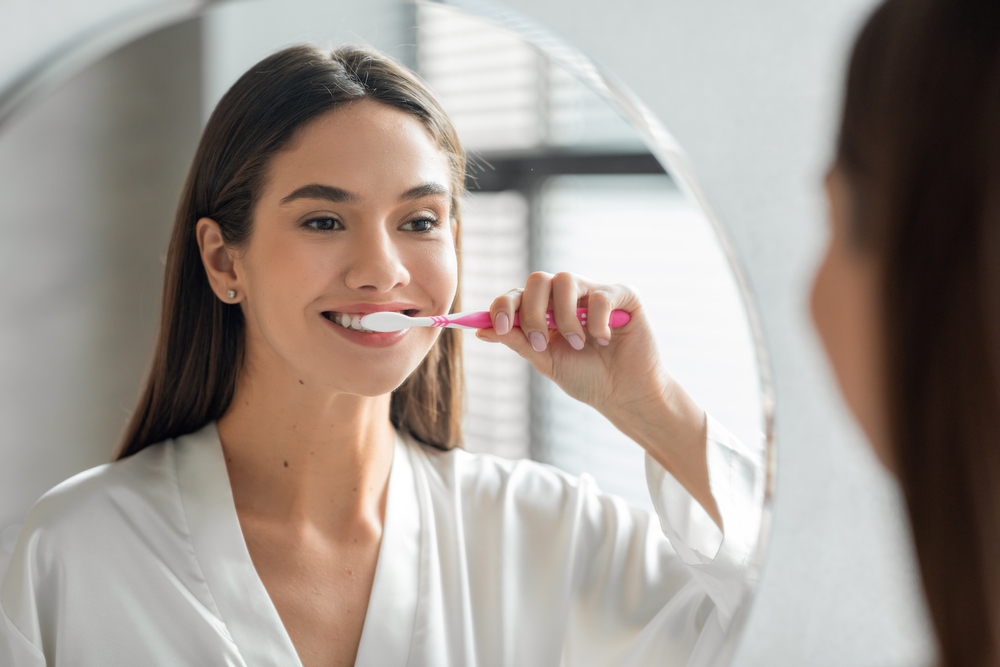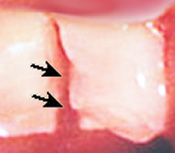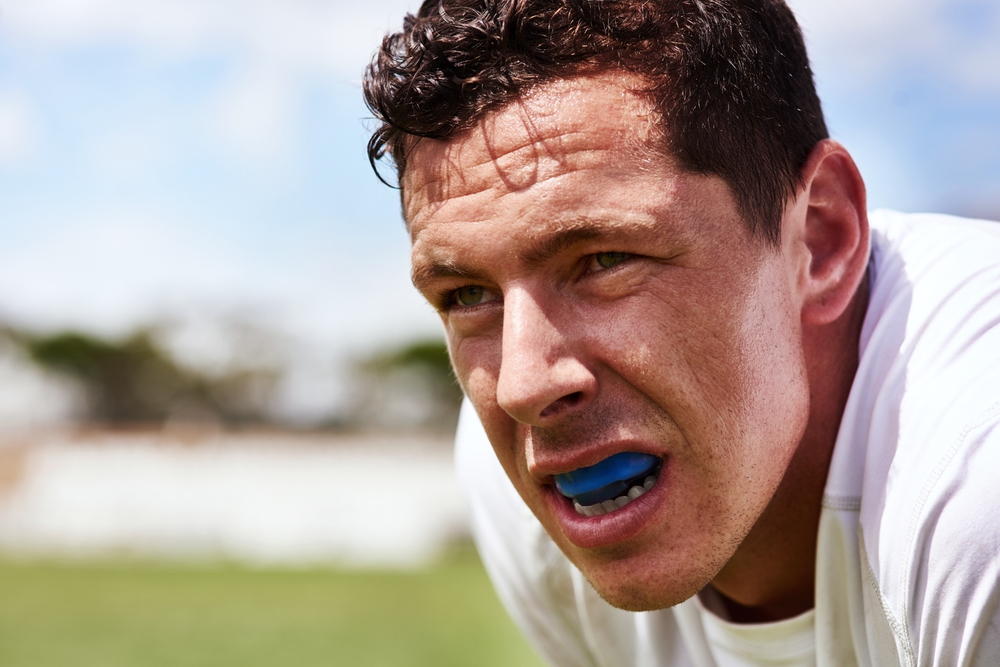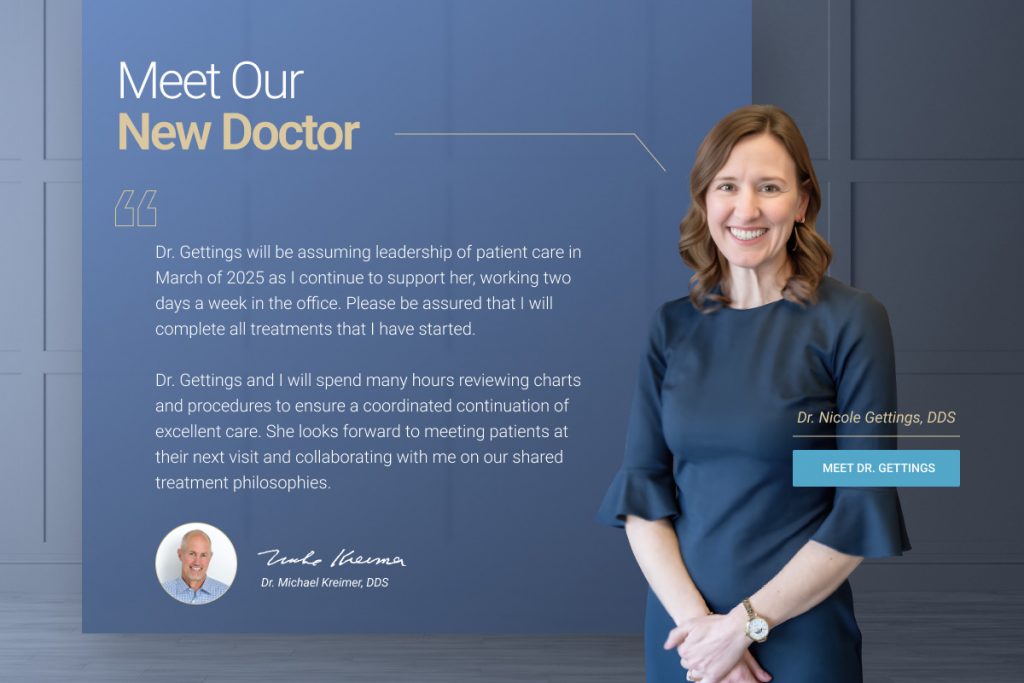Treat Your Dental Restorations Right: A Guide to Dental Crown Care
Proper care for your dental crownsis essential for long-lasting success at Michael Kreimer, DDS, Family and Implant Dentistry in Loveland, Ohio. Our practice provides comprehensive crown care guidance to patients throughout the region. Understanding proper crown care helps you maintain your restoration’s beauty and function for decades.
Experiencing issues with your temporary crown? Call Michael Kreimer, DDS, at (513) 677-3656immediately for guidance. Our Loveland dental officeprovides emergency crown care for patients throughout Cincinnati, Mason, and Milford.
Our Dedicated and Experienced Dental Team Near Cincinnati
At Dr. Kreimer’s practice, our team of skilled professionals is committed to delivering exceptional dental care in a friendly, family-oriented environment. Led by Dr. Michael Kreimer, a Cincinnati native with decades of experience, the team includes seasoned professionals like Pamela Smith, the office manager since 1989, and dental hygienists Joanie Edelenbos and Susan Humbley, who bring over 50 years of combined expertise. Each member is passionate about building lasting relationships with patients and ensuring a comfortable, personalized experience.
Our staff’s diverse backgrounds and qualifications enhance the practice’s ability to provide comprehensive care. From Missy Stewart’s 10 years as a dental assistant to Bonnie Pugh’s extensive experience at the front desk, the team works seamlessly together to create a supportive atmosphere. Their shared commitment to patient care and their love for their work make every visit feel like a warm, welcoming experience, fostering a sense of trust and community.

Essential Daily Care Practices for Dental Crowns
Proper Brushing Techniques
Caring for crowned teeth requires specific brushing techniques that protect both the crown and the surrounding natural teeth. Use a soft-bristled toothbrush to avoid scratching the crown surface. Brush gently in circular motions, paying special attention to the area where the crown meets your gum line.
Position your toothbrush at a 45-degree angle to effectively clean the crown margins. This angle allows the bristles to reach under the gum line, where bacteria can accumulate. Spend extra time brushing around crowned teeth to remove all plaque and food particles.
Effective Flossing Methods

Water flossersprovide excellent cleaning around crowns without the risk of crown damage. The pulsating water removes bacteria and debris from areas that traditional floss might miss. Many patients find water flossing more comfortable and effective for crown care.
Ready to learn more about proper crown care? Call Michael Kreimer, DDS, at (513) 677-3656to schedule your crown care consultation. Our Loveland practice serves patients from Cincinnati, Mason, and Milford with comprehensive crown maintenance guidance.
Mouthwash Selection and Use
Antimicrobial mouthwashes provide additional protection for crowned teeth by killing bacteria that cause decay and gum disease. Choose alcohol-free formulations to avoid drying your mouth, which can increase bacterial growth. Rinse for 30 seconds after brushing and flossing for maximum benefit.
Fluoride rinses offer extra protection for the natural tooth structure around your crowns. These rinses strengthen enamel and help prevent decay at the crown margins. Use fluoride rinses as directed by your dentist for optimal results.
Protecting Your Crowns from Damage
Avoiding Harmful Habits
Certain habits can severely damage dental crowns and shorten their lifespan significantly. Using your teeth as tools or chewing hard objects like ice can put stress on crowns, causing them to crack.
Teeth grinding and clenching during sleep can destroy crowns quickly. The excessive forces generated during bruxism can crack porcelain, loosen crowns, or damage the underlying tooth structure. Night guards provide essential protection for crown patients who grind their teeth.
Dietary Considerations
- Hard foods pose significant risks to dental crowns. Nuts, hard candies, and crusty bread can chip or crack crown materials. Cut hard foods into smaller pieces and chew carefully to minimize crown stress. Avoid biting directly into hard foods with crowned front teeth.
- Sticky foods can pull crowns loose or trap bacteria around crown margins. Caramel, taffy, and sticky candies create problems for crown patients. If you eat sticky foods, rinse thoroughly afterward and brush as soon as possible to remove residue.
- Acidic foods and beverages can weaken the cement holding your crown in place. Limit consumption of citrus fruits, sports drinks, and sodas. When you do consume acidic items, rinse with water afterward and wait at least 30 minutes before brushing to avoid enamel damage.
Temperature Sensitivity Management
New crowns may cause temporary sensitivity to hot and cold temperatures. This sensitivity typically resolves within a few weeks as your tooth adjusts to the restoration. Use toothpaste designed for sensitive teeth to minimize discomfort during this adjustment period.
Long-Term Crown Maintenance
Monitoring Crown Condition
Learn to recognize signs of crown problems so you can seek treatment promptly. Loose crowns may feel different when you bite down or may move slightly when touched with your tongue. Contact your dentist immediately if you notice any changes in how your crown feels.
Visible changes around crown margins, such as dark lines or rough edges, indicate potential problems. These changes may signal decay, gum recession, or crown deterioration that requires professional attention. Early treatment often prevents more serious complications.
Lifestyle Modifications for Crown Longevity
Sports participation requires special crown protection. Custom-fitted mouthguardsprotect crowns from trauma during contact sports. Even non-contact sports can pose risks if falls or collisions occur. The investment in a quality mouthguard protects your crown investment.
- Stress managementhelps protect crowns from damage caused by teeth grinding and clenching. Stress reduction techniques, relaxation exercises, and counseling can reduce bruxism that destroys crowns. Many patients find that managing stress improves their crown longevity significantly.
- Sleep qualityaffects crown health through its impact on bruxism and overall oral health. Poor sleep increases stress hormones that can worsen teeth grinding. Good sleep hygiene protects your crowns and improves your overall health.
Regular Dental Checkups in Loveland, OH
Professional dental examinations are essential for crown longevity. Your dentist can detect early signs of crown problems that you might miss. Regular checkups allow for preventive interventions that can save your crowns from major damage.
During checkups, your dentist examines crown margins for decay, checks the crown’s stability, and evaluates your bite relationships. These assessments identify potential problems before they become serious issues requiring crown replacement.
Professional teeth cleanings remove plaque and tartar that home care cannot eliminate. The hygienist uses specialized tools to clean around crown margins thoroughly without damaging the restoration. Regular cleanings prevent gum disease that could compromise your crown’s foundation.
Emergency Dental Crown Care
Handling Crown Emergencies

Clean the loose crown gently with water and try to place it back over the tooth temporarily. Dental cement from the pharmacy can help hold the crown in place until you can see your dentist. Never use household adhesives, which can damage the crown or tooth.
Crown fractures or chips require professional evaluation even if they don’t cause pain. Small chips can worsen over time, leading to crown failure. Your dentist can often repair minor crown damage, preserving your investment.
Pain Management
Over-the-counter pain relievers help manage crown-related discomfort until you can see your dentist. Follow package directions and avoid exceeding recommended doses. If pain is severe or persistent, contact your dentist for stronger pain management options.
Cold compresses reduce swelling and numb pain around crowned teeth. Apply ice wrapped in a towel for 15-20 minutes at a time. Avoid applying ice directly to the skin, which can cause tissue damage.
Rinse with warm salt water to reduce inflammation and kill bacteria around troubled crowns. Mix one teaspoon of salt in a cup of warm water and rinse gently. This natural remedy provides temporary relief until professional treatment is available.
Frequently Asked Questions
Can I use whitening toothpaste on my dental crowns?
While whitening toothpaste won’t harm dental crowns, it also won’t change their color since crown materials don’t respond to whitening agents. However, whitening toothpaste can help maintain the brightness of your natural teeth to better match your crowns. Some whitening toothpastes contain abrasive ingredients that could potentially scratch crown surfaces over time, so choose gentle formulations. If you’re concerned about crown and tooth color matching, discuss professional whitening options with your dentist.
What should I do if food keeps getting stuck around my crown?
Persistent food trapping around crowns may indicate problems with the crown’s fit or contour. While some food accumulation is normal, excessive trapping suggests the crown margins may need adjustment or the crown may be loose. Use a water flosser to remove trapped food particles, and contact your dentist if the problem persists. Your dentist can evaluate the crown’s fit and make necessary adjustments to reduce food trapping and improve comfort.
How can I tell if my crown needs professional attention?
Several signs indicate your crown needs professional evaluation, including persistent pain or sensitivity, visible changes in the crown’s appearance, a loose feeling when biting, or dark lines appearing at the gum line. Bad taste or odor around the crown may signal bacterial infection or decay. Changes in your bite or jaw comfort can also indicate crown problems. Contact your dentist promptly if you notice any of these warning signs to prevent more serious complications.
Can dental crowns be repaired if they get damaged?
Minor crown damage can often be repaired, depending on the extent and location of the damage. Small chips in porcelain crowns can sometimes be polished smooth or repaired with composite resin. However, significant cracks, fractures, or damage to the crown’s fit typically require complete crown replacement. Your dentist will evaluate the damage and recommend the most appropriate treatment. Early treatment of minor damage can sometimes prevent the need for complete crown replacement.
How do I care for crowns if I have gum disease?
Patients with gum disease need extra diligent crown care to prevent complications. Use an antimicrobial mouthwash daily and consider more frequent professional cleanings as recommended by your dentist. Gum disease can cause recession that exposes crown margins, increasing decay risk. Follow your periodontist’s treatment recommendations carefully, as untreated gum disease can compromise crown stability and longevity. Your dentist may recommend special cleaning tools or techniques for effective plaque removal around crowns.
Maximize Your Crown Investment With Dental Care Near You
Proper crown care is an investment in your oral health that pays dividends for decades. The time and effort you spend maintaining your crowns properly protects your financial investment and preserves your beautiful smile. Good crown care prevents expensive replacements and maintains optimal oral health.
At Michael Kreimer, DDS, Family and Implant Dentistry, we provide comprehensive crown care education and support to help you maximize your restoration’s lifespan. Our team is always available to answer your crown care questions and provide guidance when problems arise.
Ready to learn more about optimal crown care? Contact Michael Kreimer, DDS, at (513) 677-3656to schedule your crown maintenance consultation. Our Loveland dental practiceproudly serves patients from Cincinnati, Mason, Milford, and surrounding communities who want to protect their crown investment with proper care.



